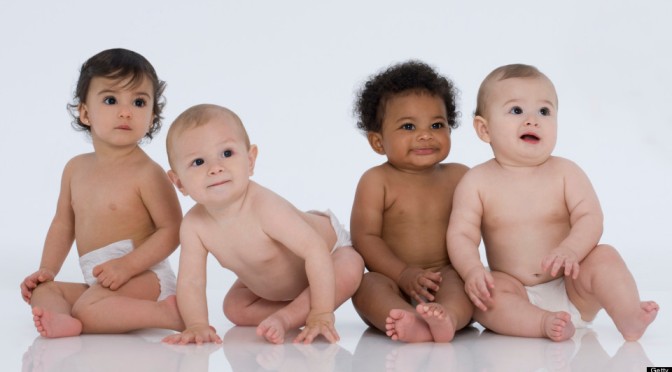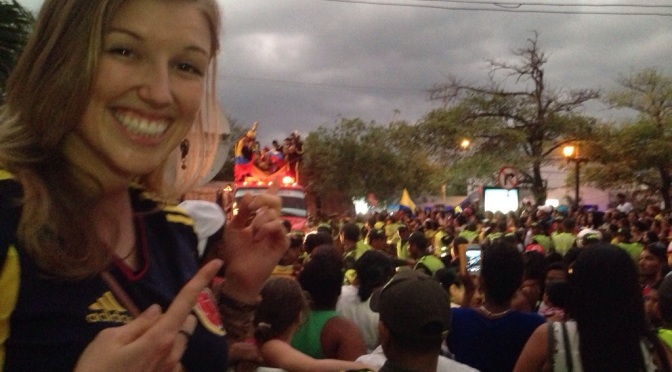Babies are everywhere these days. The ubiquitous mini-humans are all over my Facebook feed; the mall is full of strollers; my friends talk about their conception windows. Here in Colombia, baby season (roughly 9 months past Carnaval) is upon us.
What is it about being a young female that people look at you and think, “she looks like she’d love to wear maternity jeans!”? The pressure multiplies when you hit your mid-twenties, regardless of your marital status, your economic fortitude or, you know, personal opinions.
Suddenly, the all-consuming question is, “When are you going to have kids?”
It’s a common icebreaker, considered within the appropriate range of small talk. And in some cases, it can be. But it shouldn’t be an assuming, leading question that frames the concept in a “not if but when” format.
This has got me thinking. Why do we think it’s okay to ask women this question? No one asks my male friends when they’re planning to procreate. They get asked about their careers and their cars. Especially here in Colombia, where women struggle against the prevalent machismo culture and teen pregnancies, I feel that it’s important to present an alternative view to the assumption that “women are for making babies and keeping house.”
I used to laugh it off, but lately I am more likely to challenge the idea. It usually starts a conversation where I can voice these opinions and try to broaden perspective on the issue. So sometimes I say “I never want kids” just to rebel against the assumptions.
“I don’t want kids,” I’ll say.
“Never ever?” they ask incredulously.
“I have other priorities,” I declare.
Now, let me clear. I don’t actually know whether I want to have children. Maybe so, maybe not. That’s for a private decision in the distant future. And furthermore, I am not advocating against having children, or criticizing well-meaning, curious small-talkers. Nor do I want to detract from the absolutely beautiful concepts of motherhood and building families. This isn’t an argument for or against having children, or wanting children, or even liking children. It’s simply an argument against the subliminal underlying assumptions of this question.
So I am going to challenge the basic presumption of “When are you going to have kids?” until we start asking the questions that matter. And on that note, here are five reasons that we should stop asking that question.
1.Being a mother is not my raison d’etre.
Despite the fact that we live in the 21st century, society’s treatment of motherhood continues to be archaic (see also: outrage at breastfeeding in public; anti-abortion laws). This extends to society’s ideal of what womanhood is about. Let me start by saying that womanhood and motherhood are NOT THE SAME THING. Not being a mother doesn’t make me any less of a woman.The assumption that a woman’s highest purpose in life is to procreate is, simply put, sexist. It suggests that her value is not measured by her intelligence, her creativity, her strength, her compassion and her unique human spirit.
When a woman becomes a mother, something I’m told is life-changing and intrinsically beautiful, she adds a new, intimate relationship to her existing plethora of experiences. She grows as a person and develops new perspectives and wisdom, but she doesn’t become valuable for her new role in society. She is already valuable.
2. I want to be remembered for my work, not for my offspring.
From what I can tell, having children has biological and evolutionary importance. Historically, biological offspring are a way to carry on one’s legacy in the gene pool. The more children, the more allies; the more DNA you spread, the more likely you can dominate and ensure survival. Luckily for me, I’m not a cavewoman. Hear that? My survival isn’t determined by physical tribe-on-tribe battle. My legacy gets to be something else. Like whatever I want. So there.
I don’t want to detract from the obvious benefits of a genetic legacy. It must be beautiful to see your own DNA duplicated in a mini me. Children can carry on your family name and values. However, I’d prefer to define my legacy by things that I’ve done. In particular, I want my words and experiences to be my legacy, and whether that’s by writing them down or by telling them to offspring is up to me.
3. I don’t want to define my success based on other people’s standards.
My goal in life is not: “get married, buy a house, have kids.” I see that our society still defines success as having a family (especially for women.) You haven’t reached success until you fit that standard. It is disgusting to see the amount of pressure that society uses to teach women that their purpose in life is to have children, whether it is through subliminal gender messages in the media and toy store or well-meaning but insulting comments that seem to say, “I know better than you what you should do with your life.”
4. Having kids isn’t on my priority list.
People used to say, “oh, but just give it a few years! You’ll come around!” Yet here I am at 25 years old, and I still don’t see them in my 5- or 10-year plan. The truth is that while I love kids, I can’t imagine them in the foreseeable future. I see many other priorities.
One of my priorities is to further my education. I am heading for my master’s next year, then I’ll probably pursue a Ph.D. sometime after. I love to learn and analyze and teach, something that won’t likely change.
Another goal is to work in a field that continuously challenges me and brings me close to people and places where important things are happening. I love to be close to the action, and I love to be part of the difference being made.
I have so many other dreams and visions and goals and for now, children would just be an obstacle to accomplishing what I feel I’m setting out to do. No one should have kids unless they are ready for them. They’re not on a to-do list.
5. I don’t feel any need to say “yes” to satisfy societal pressure.
I am sick of people asking when I’m going to have kids. Why don’t they ask if? I understand that it’s a common thing to do, but it’s not fair to assume that just because everybody else is doing something that I should, too. Don’t teach me to think for myself, then tell me to follow the crowd. You’re being inconsistent, society.
This recent article in the Huffington Post, about talking to little girls, shows the powerfully deceptive ways that gender roles are perpetrated. The author made me think about how we phrase our assumptions in the form of a question. When we ask the question a certain way, we’re suggesting that the answer fit the same format. So if you say, “When do you want kids?” I can’t answer with a “yes” or “no” or “maybe.” It has to be a time frame. And that’s not fair.
Ask me another!
I am speaking up for my fellow women who, whether or not they have or want children, are worthy of their dreams and goals. I am writing for everyone who has felt pressured to fit into a societal box or to fulfill “a biological paramount.” I am standing up my right to say, “if” or “never” or “ask me a better question.”
Let’s try to empower women for their abilities instead of reinforcing their stereotypes. Here is what to ask next time:
Q: When are you going to have kids?
Q: What are you passionate about? What are your dreams?
Many young women are doing exciting things and have unique perspectives to share about their passions, their interests, their dreams. Take that as a conversation starter and see what you can learn!
So, the next time someone asks me, “When are you going to have kids?” I have my answer ready: “I don’t know if I’m going to have kids, and that’s okay. Ask me about my dreams!”





![IMG_8193[1]](https://pocketphilosophies.files.wordpress.com/2015/07/img_81931.jpg?w=300&h=300)
![IMG_8201[1]](https://pocketphilosophies.files.wordpress.com/2015/07/img_82011.jpg?w=300&h=200)
![IMG_8181[1]](https://pocketphilosophies.files.wordpress.com/2015/07/img_81811.jpg?w=300&h=225)




![IMG_8260[1]](https://pocketphilosophies.files.wordpress.com/2015/07/img_82601.jpg?w=150&h=150)
![IMG_8152[1]](https://pocketphilosophies.files.wordpress.com/2015/07/img_81521.jpg?w=300&h=225)
![IMG_8461[1]](https://pocketphilosophies.files.wordpress.com/2015/07/img_84611.jpg?w=300&h=225)
![IMG_8232[1]](https://pocketphilosophies.files.wordpress.com/2015/07/img_82321-e1436800315840.jpg?w=300&h=184)
![IMG_8455[1]](https://pocketphilosophies.files.wordpress.com/2015/07/img_84551.jpg?w=225&h=300)
![IMG_8090[1]](https://pocketphilosophies.files.wordpress.com/2015/07/img_80901.jpg?w=150&h=113)
![IMG_8099[1]](https://pocketphilosophies.files.wordpress.com/2015/07/img_80991.jpg?w=300&h=225)


